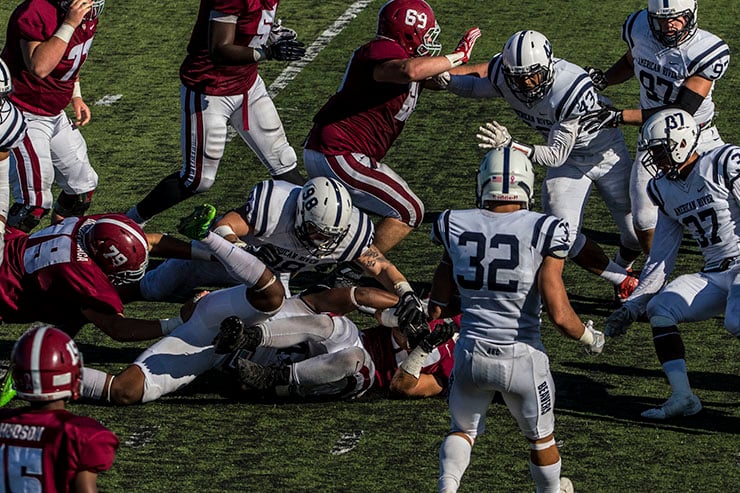I have taught at a small liberal arts college for 25 years. That’s quite a few fall semesters.
There is much I love about the start of a new academic year. The heat of the summer begins to give way ever so tentatively to the delectable perfection of autumn. The fresh faces of the first-year students, still—for a moment, at least—perfectly pristine, unjaded, and eager to take on new ideas. Even the courses I have taught countless times seem fresher after three months away from them.
One of the things I most treasure about the start of a new school year, however, is the sight of all the student athletes out and about—running, jumping, throwing things, lifting other things, and just generally being symbols of the vibrant energy of young life. The sun shines gloriously on them as they burst forth in all their youthful strength, speed, and pure physical life force. They take out their golf clubs and their lacrosse gear, their football pads and their running shoes, and they make me remember being young in a way that nothing else can approximate.
The other day, driving back from campus after a class, the football team was out on the practice field. Down the road in front of them were some kids from the cross country team. Members of the women’s basketball team, a few of whom I’ve had in class, were walking together over to the nearby gym. It was a perfect image of the spirit of the new school year for me.
I do not know how widespread my view is among the faculty here, or among professors generally. I have many faculty colleagues who are frank about their hatred for college athletics. This is not uncommon on many campuses, I suspect. Some suggest the supposed “injustice” of the fact that some sports are more popular than others is the basis for their outrage. They feign indignation that those who play the popular sports stand to gain materially while others do not. The “injustice” argument, of course, can be extended to the “unfair” distinction between those students who are athletes and those who are not.
Other anti-sports professors are more straightforward. Sport is bad, they argue, and utterly inferior to the life of the mind. Athletics appeals to the lowest qualities of the human population and more enlightened individuals have long since given up this primitive practice. The distinguished historian Hayden White argued that sports has nothing whatever in common with truly profound human experiences and “[g]lorifying the ‘moments of presence’ in sport is a gratuitous sellout to the entertainment industry.”
Let’s be honest, shall we? Much of the hatred intellectuals have for sport and for athletes is resentful envy. These are people who were never full of such youthful vigor and power. They also typically lacked other necessary qualities that result in success in sports. They never had the physical discipline to commit themselves to the demanding and exhausting routine of exercise and practice needed to develop skills and excel in sport. They did not have the requisite physical courage to push themselves to failure, to run until their legs were afire, to tackle and be tackled, to stand in and face strong youths throwing or otherwise causing hard objects to hurtle toward them at potentially dangerous velocities. They were bookish outcasts who sat inside and watched jealously through the window as others expressed their untamable animal natures through the beautiful cultural codes of sport. I have seen these people walking around in universities in large numbers now for the entirety of my adult life.
I repeat, I am a college professor. I do not deny for a minute that I read a lot of books as a kid, and later in life as well, and I have relished the great amount of time I have spent inside my own head, conversing with frequently deceased writers of words I found in the books they left us. But I also loved to run and to jump and to ride my bike and to get the baseball or football or basketball and head out to the field or diamond or court with my friends. And I deeply appreciated the elegant majesty of the young human body exerting itself against the physical world, including that part of it made up of other young human bodies.
In the gym of the school that employs me, which happens to be the alma mater of baseball immortal Christy Mathewson, there is a quote from “Big Six” on the second story of the building. It reads: “The pursuit of athletics in college need not interfere with a fellow’s studies, and if you give a person a well-developed body their brain will get the benefit of it.”
I once had a conversation about that quote with a former student, a member of the baseball team, a talented scholar-in-the-making, and an admirably morally grounded young man. He was genuinely curious as to why some of his professors looked askance at him as soon as they learned of his athletic endeavors. I told him that I believe it is fundamentally because so many of them have, in their own minds at least, separated the human mind from the human body in a manner Mathewson would have found baffling and contrary to reality.
I would never do away with college athletics and the student-athlete. The American college is unthinkable without them.

Leave a Reply